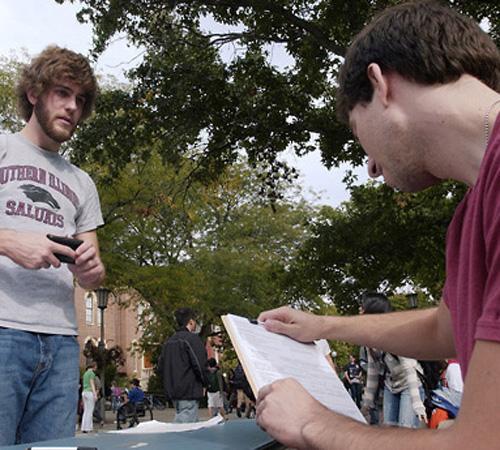Student groups hope peers will choose to vote

Ryan James, right, of College Democrats looks over a voter registration form with Jeff Dachauer, Freshman in LAS, outside the Union on Monday. Dachauer was already registered in his hometown, having voted in the 2006 elections, and decided to transfer his Erica Magda
October 16, 2007
Census Bureau statistics released on Oct. 1 indicate that more college-age voters are heading to the polls on Election Day.
According to statistics assembled from previous reports, 47 percent of 18- to 24-year-old people voted in the 2004 election. This was an 11 percent increase from the 2000 election. However, participation of college-age students is still dwarfed by the participation of older voters.
Kelly Solomon, senior in Business and president of College Republicans, said she thinks student turnout at the polls for Election Day voting depends on how informed students are.
“I think a lot of students just aren’t as informed as the rest of the population,” Solomon said. “I think it pretty much comes down to that.”
Ryan James, junior in LAS, said the College Democrats are focusing mainly on voter registration to increase student turnout for the coming election. James oversees the organization’s voter registration drive.
Get The Daily Illini in your inbox!
“In my opinion, I think the older generation does not realize how much students have to deal with, like staying on top of five or six courses while keeping up with politics at the same time,” he said.
Student organizations like the College Democrats have started to encourage students to vote in the upcoming Feb. 5 primary election.
The College Democrats have been sponsoring a voter registration drive since Sept. 4. They register voters at a booth in front of the Illini Union on the Quad. The College Democrats have registered about 800 people to vote.
“We’ll keep going until it gets too cold to sit out here,” James said. “We’ll probably surpass a thousand by the end of the semester and about 70 to 80 percent of them will vote.”
The College Republicans will be starting their voter registration drive at the end of this semester. In addition to registering voters, the College Republicans will be hosting a debate early next semester where each student will be representing presidential candidates to stimulate discussion closer to Election Day.
Both Solomon and James seem to have positive hopes for the student turnout in the coming election.
“Over all, I think the turn out (on this campus) will be above the national average,” James said.
Solomon said she feels that there will be an increase in student voters for the upcoming election, but it may be undermined by negative attitudes.
“A lot of people have very strong feelings about politics in the last four to eight years,” she said. “But at the same time, a lot of students feel their vote doesn’t matter as much.”
Brian Gaines, associate professor of political science, said that historically, student voters have been considered the unreliable vote.
“The youth vote is notorious for being low,” Gaines said.
The increase seen between 2000 and 2004 could have been caused by a sense of duty felt by students because of the events of Sept. 11, Gaines said. He also said that new networking sites like Facebook, which allow students to remind and encourage their peers to vote, could also have an effect.
There has not been solid evidence that explains the general increase in student voting.
“These reasons are awfully speculative,” he said. “There are a lot of theories out there that haven’t been tested.”






